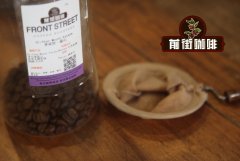Factors affecting coffee fermentation basic principle of coffee fermentation

Professional coffee knowledge exchange more coffee bean information please follow the coffee workshop (Wechat official account cafe_style)
Francine Vidal (Francine Vidal) is the coffee project manager at Lallemand LALCAFE, a branch of Lallemand that provides yeasts and bacteria for controlled fermentation of coffee. The company offers several yeasts that have different effects on the taste, acidity and taste of specific fruits or flowers. "during the fermentation or impregnation of this coffee, yeast can degrade the slime of coffee beans," Francine told me. " "this type is called denuclearization."
Found more dissecting coffee cherries.
But she also explained that fermentation is crucial because it affects the taste and aroma produced in the cup.
"mucus is made up of sugars, amino acids, aroma precursors, etc.," she told me. "so, if you want to reveal and express the potential aroma in coffee beans, you have to pay attention to this."
Remember how sugars and acids are decomposed during fermentation? It is these same reactions that form the taste. If sugars and acids are decomposed under controllable conditions and in an appropriate temperature and time range, the flavor and aroma of coffee beans will be more attractive.
Good and bad coffee fermentation
Francisco Quezada is the CEO of Montenegro Farm in Guatemala. He told me, "after good fermentation, you can get the characteristics of coffee." In other words, good fermentation will not improve the quality of coffee, because coffee already has quality in the field. But we can take advantage of and maintain those features from the wild. "
However, fermentation is not always good. "bad fermentation can degrade or produce bad quality," he stressed.
"what we find in the overfermented coffee is the taste of the wine, but the wine has gone bad," he said. " Even before he drank the coffee, he could recognize signs of overfermentation: coffee beans had a red color and an unappetizing aroma of rotten fruit.
For these reasons, producers must understand fermentation and control it as much as possible.
END
Important Notice :
前街咖啡 FrontStreet Coffee has moved to new addredd:
FrontStreet Coffee Address: 315,Donghua East Road,GuangZhou
Tel:020 38364473
- Prev

Why is coffee fermented? can you drink coffee after it is fermented? what is coffee fermentation?
Professional coffee knowledge exchange more coffee bean information please follow the coffee workshop (Wechat official account cafe_style) in coffee, fermentation is very important. It can not only remove mucus, but also affect many tastes and sensory characteristics. Controlling it during coffee processing means you can improve quality and consistency. However, fermentation is complex, and in farm management it may be a
- Next

High quality coffee beans recommend Costa Rican Stonehenge F1 complex and rich fruit flavor
Professional coffee knowledge exchange more coffee bean information please follow the coffee workshop (Wechat official account cafe_style) front street-high-quality coffee beans recommended Costa Rica Stonehenge Black Honey F1 introduction to the front street there is a boulder manor black honey treatment, black plum, berries, sweet and sour balance suitable for cloth like sour but do not like bitter friends, and this time to recommend this is a Costa Rican giant
Related
- Beginners will see the "Coffee pull flower" guide!
- What is the difference between ice blog purified milk and ordinary milk coffee?
- Why is the Philippines the largest producer of crops in Liberia?
- For coffee extraction, should the fine powder be retained?
- How does extracted espresso fill pressed powder? How much strength does it take to press the powder?
- How to make jasmine cold extract coffee? Is the jasmine + latte good?
- Will this little toy really make the coffee taste better? How does Lily Drip affect coffee extraction?
- Will the action of slapping the filter cup also affect coffee extraction?
- What's the difference between powder-to-water ratio and powder-to-liquid ratio?
- What is the Ethiopian local species? What does it have to do with Heirloom native species?

